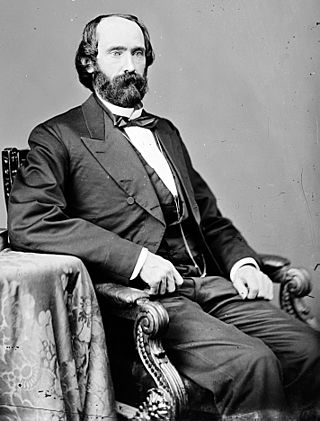This article needs additional citations for verification .(September 2022) |
Notes
- 1 2 3 4 Eicher, John H., and David J. Eicher, Civil War High Commands. Stanford: Stanford University Press, 2001; ISBN 978-0-8047-3641-1. p. 374.
- ↑ Eicher, John H., and David J. Eicher, Civil War High Commands. Stanford: Stanford University Press, 2001. ISBN 978-0-8047-3641-1. p. 752.
Related Research Articles

Wager Swayne was a Union Army colonel during the American Civil War and was appointed as the last major general of volunteers of the Union Army. Swayne received America's highest military decoration the Medal of Honor for his actions at the Second Battle of Corinth. He also was effectively the military governor of Alabama from March 2, 1867, to July 14, 1868, after the passage of the first Reconstruction Act by the U.S. Congress until Alabama was readmitted to the Union. Robert M. Patton remained the nominal governor during this period but as the local army commander, Swayne controlled the State government. During the Reconstruction era, Swayne oversaw the Freedmen's Bureau in Alabama and helped establish schools for African Americans in the state. He was the first person born after Alabama statehood, to govern the state.

William Birney was an American professor, Union Army general during the American Civil War, attorney and author. An ardent abolitionist, he was noted for encouraging thousands of free black men to join the Union army.

John Irvin Gregg was a career U.S. Army officer. He fought in the Mexican–American War and during the American Civil War as a colonel and near the end of the war as a brevet general in the Union army. In 1866, he was nominated and confirmed as a brevet major general of volunteers and a brevet brigadier general in the Regular Army, both to rank from March 13, 1865.

Edwin Stanton McCook was an American soldier and politician. A Union Army officer during the American Civil War and a postbellum politician in the Dakota Territory, he was assassinated in office while serving as acting governor on September 11, 1873.

Charles Camp Doolittle was a store clerk, general in the Union Army during the American Civil War, and a bank cashier.

Gilbert Marquis LaFayette Johnson was an officer in the Union Army from Indiana during the American Civil War, reaching the rank of colonel. In 1866, he was nominated and confirmed for appointment to the grade of brevet brigadier general.

William Lewis Stoughton was a politician and soldier from U.S. state of Michigan who served in the United States Congress, as well as serving as an officer and brigade commander in the Union Army during the American Civil War.

Charles Henry Grosvenor was a multiple-term U.S. Representative from Ohio, as well as a brigade commander in the Union Army during the American Civil War.

Henry Blackstone Banning was a lawyer and three-term U.S. Representative from Ohio, as well as an infantry officer in the Union Army during the American Civil War.

Thomas Worcester Hyde was an American Union Army colonel, a state senator from Maine, and the founder of the Bath Iron Works, one of the major shipyards in the United States. He wrote two books about his experiences during the American Civil War and at the Battle of Gettysburg.

William Linn McMillen was an American surgeon, army officer, farmer and carpetbagger legislator.

Peter John Sullivan was an Irish-American soldier and lawyer, who became United States Ambassador to Colombia.
Sylvester Gardner Hill (1820-1864) was a colonel in the Union Army during the American Civil War. He served as a brigade commander during the Red River Campaign and Battle of Nashville where he was killed in action. He received a posthumous appointment as a brevet brigadier general.

Charles Henry Tucker "Tucky" Collis was an Irish-American US Army officer who received the Medal of Honor for his actions in the American Civil War.
Oliver Wood was a Union Army colonel during the American Civil War.
William Tecumseh Wilson was a Union Army officer during the American Civil War.
Thomas J. Williams was a Union Army officer during the American Civil War.

Aquila Wiley was a Union Army officer in the American Civil War.
Ulysses Doubleday was a Union Army colonel during the American Civil War. In 1866 he was nominated and confirmed for appointment to the grade of brevet brigadier general of volunteers, to rank from March 13, 1865.
Adrian Rowe Root was an American commission merchant, warehouse executive, newspaper editor and military officer in the Union Army during the American Civil War. He served as brigade commander for much of the war but his highest actual substantive grade was colonel. His March 2, 1865 nomination for appointment as brevet brigadier general of volunteers to rank from March 2, 1865, was confirmed by the United States Senate on March 9, 1865. His January 13, 1866 nomination for appointment as a brevet major general of volunteers, to rank from March 13, 1865, was confirmed by the U.S. Senate on March 12, 1866.
References
- Eicher, John H., and David J. Eicher, Civil War High Commands. Stanford: Stanford University Press, 2001. ISBN 978-0-8047-3641-1.
- Whalen, Charles; Whalen, Barbara (2006). The fighting Mccooks. Bethesda, Md.: Westmoreland Press. ISBN 978-0977908158.
External links
- Ohio Historical Society
- U.S. Senate biography of McCook
- United States Congress. "Anson G. McCook (id: M000358)". Biographical Directory of the United States Congress . Retrieved on 2008-12-27
Anson George McCook | |
|---|---|
 | |
| 9th Secretary of the United States Senate | |
| In office December 18, 1883 –August 7, 1893 |